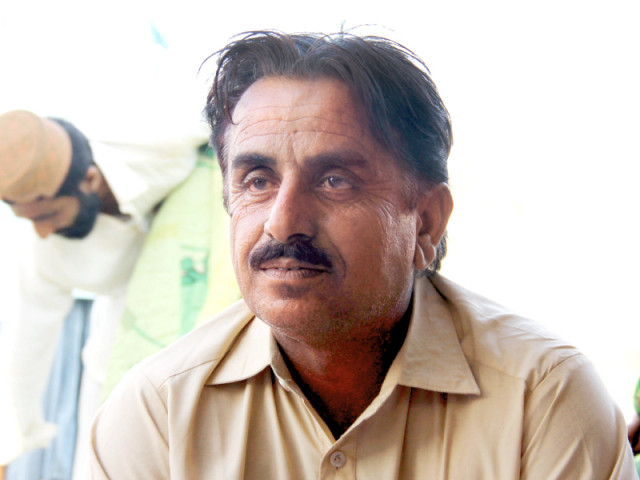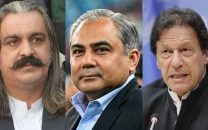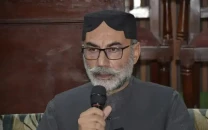Healing hands: A doctor among the dunes
Achhro Thar’s locals come calling for a doctor and his ‘camel ambulance’.

“It is not possible for me to cover the entire Achhro Thar area, but I try to attend to as many patients as I can,” says Dr Haathi Singh. PHOTO: EXPRESS
If you’re a resident of Achhro Thar – the vast ‘white desert’ that connects Pakistan to India’s Rajasthan – and you feel unwell, who’re you gonna call? Well, owing to patchy signals in the area, you may be unable to give someone a phone call, but if you climb atop the nearest sand dune and call out for Dr Haathi Singh, the good doctor will reach you as soon as he hears your cry.
Dr Singh, the only MBBS doctor in the area, and his emergency medical kit has been traversing the desert on a ‘camel ambulance’ for ten years now. “It is not possible for me to cover the entire Achhro Thar area,” Dr Singh tells The Express Tribune, “But I try to attend to as many patients as I can.” After years of voluntary service, Dr Singh now also works at the Saeedao Government Dispensary, the only medical facility catering to an area of 4,000 square kilometers.
Dr. Singh belongs to the Thakur, Rajput clan of Rab Laho village, residents of Khipro Tehsil in Sanghar district, located adjacent to the Pak-India border. After receiving his primary education in his village, Dr Singh moved to Hyderabad for higher secondary education. In 1997, he was an MBBS student at Liaquat Medical College Jamshoro and after completing his house job, he returned to his home to tend to those living here. “During my childhood I used to see dying animals and poor ailing people unattended by doctors,” Dr Singh explains. “My father wished for me to become a typical ‘Thakur’ who could manage his livestock business, but I was curious to do something different.”
Soon after he graduated, the Sindh Agriculture and Forestry Workers Coordinating Organization (Safwco) came calling. They were seeking a professional doctor who could work in the community as part of their volunteer program. “Since there is no road in the entire desert area here, people use camels and donkeys as their mode of transport,” Dr Singh says. Thus, Safwco provided the doctor with a ‘camel ambulance’ equipped with medical kit. Soon he was treating up to 30 patients a day. Dr Singh remained with Safwco for nearly five years before moving on to a government job. He now received Rs20,000 in addition to his salary as ‘hard area allowance’, monetary incentives offered to professionals working in this area.
Locals here speak of Dr Singh as a ‘godsend’. “In case of emergency, we have to call someone in Sanghar or Khipro to arrange a jeep to move the patient to the hospital,” said Atta Muhammad Rajar of Tarr Khatho Rao village. “Both towns are 70 to 100 kilometers away from our homes and we have to pay Rs5,000 to travel the two-hour distance.” While Dr Singh removes the need for such travel, Rajar says he is ‘no less than an angel’ for the villagers as he accepts payment for his services whenever his patients are able to arrange the finances to do so. “Most of the villagers pay him when they sell their animals,” Rajar says, “And he never ever argues with them over payment.”
Dr Singh provides first aid treatment to serious patients and then refers them to the district or taluka hospitals for further care. He reiterates the need for at least one hospital and a few basic health centres in order to remove the need for ‘quacks’ and to cater to patients who require immediate attention.
Even as the Thar region has made headlines this year for the drought conditions here, Suleman G Abro, a community development expert based in Sindh, says that the people of Achhro Thar remain marginalized. The neglect, however, is not limited to this year. A visit to more than two dozen villages here, for instance, revealed that there is only one graduate among the residents. A majority of children here work as herdsmen. While education remains a pressing need, so too are electricity and communication lines. “People here believe in Piri Muridi,” explains Abro. “They vote in the name of their murshid (spiritual leader) and elected representatives do not bother to resolve any of their problems. This vicious cycle goes on for many decades,” he said.
Published in The Express Tribune, April 29th, 2014.



















COMMENTS
Comments are moderated and generally will be posted if they are on-topic and not abusive.
For more information, please see our Comments FAQ